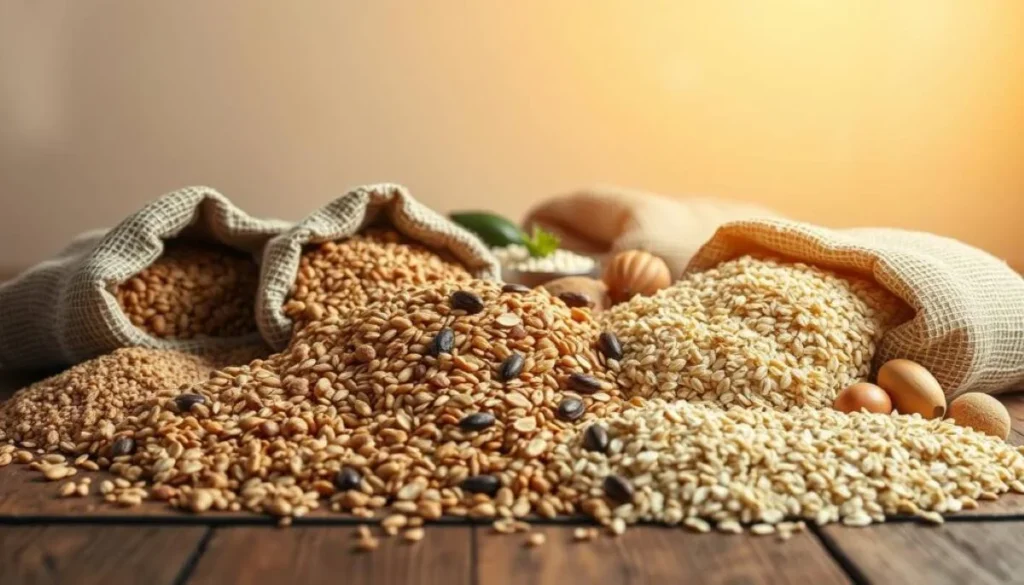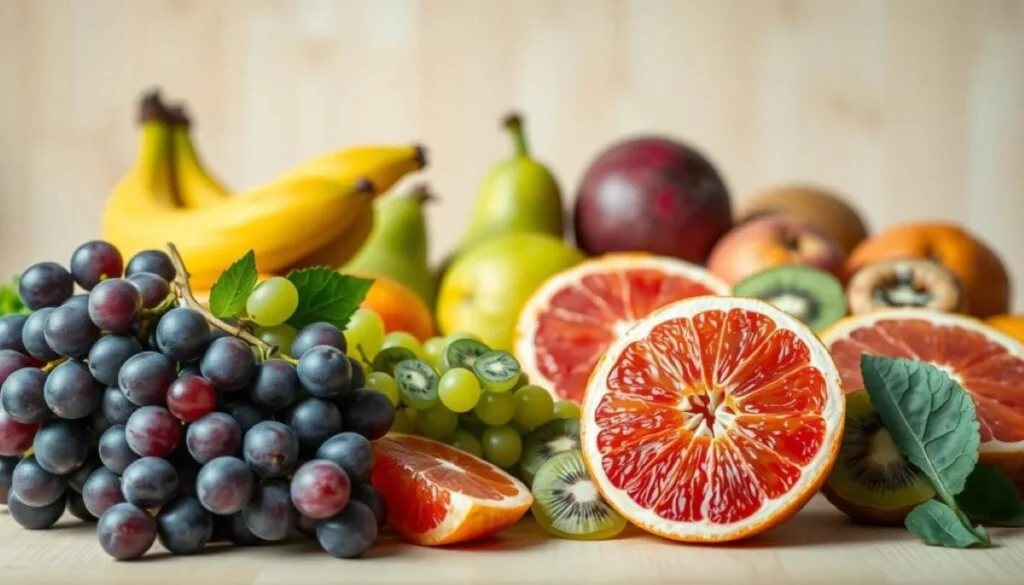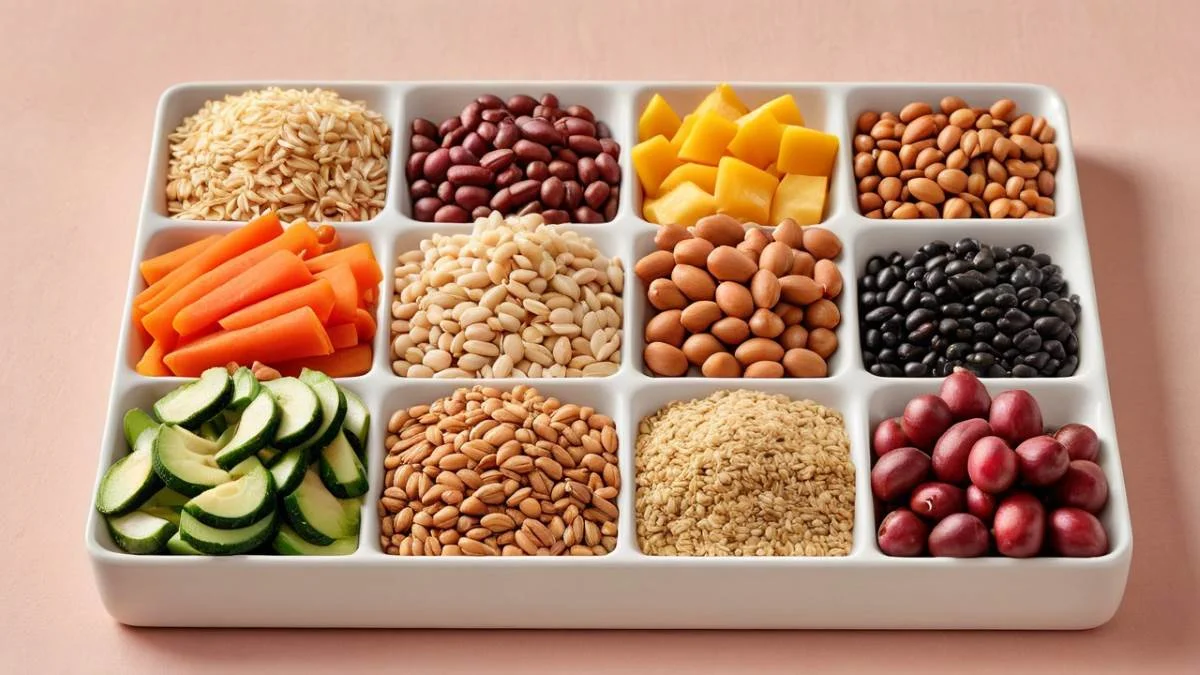Discover the Best Good Carb Foods for Your Health
Table of Contents
Knowing about good carb foods is key for staying healthy and full of energy. Carbs are often misunderstood, but they’re crucial for giving your body the nutrients and fuel it needs. Complex carbs are especially good for keeping your energy up and improving your health.
Nutrition experts say carbs should make up 45% to 65% of your daily calories. It’s not just about any carbs, though. You want to pick nutrient-rich, whole foods that help you reach your health goals.
Good carb foods do more than just give you energy. They also give you important vitamins, minerals, and fiber. These help control blood sugar, support your digestive system, and keep you feeling full longer. Choosing complex carbs over simple ones can really boost your nutrition and health.
The carbs you choose can really affect your health. Whole grains, legumes, fruits, and veggies are great sources of good carbs. They give you the energy and nutrients your body needs to work its best.
Understanding Carbohydrates and Their Role in Health
Carbohydrates are key nutrients for your body’s energy and health. Knowing how carbs affect your health helps you choose better foods.
Simple vs Complex Carbohydrates
Carbs are not all the same. Your body handles two main types differently:
- Simple carbohydrates: Quick energy sources that digest fast
- Complex carbohydrates: Slower-digesting nutrients in whole grains, fruits, and vegetables
Complex carbs from whole grains and veggies give you steady energy and important nutrients. They have more fiber, which is good for your digestion and keeps blood sugar stable.
How Carbs Affect Blood Sugar Levels
Carbs can make your blood sugar go up in different ways. Foods with a low glycemic index, like whole grains and non-starchy veggies, raise blood sugar slowly. On the other hand, processed carbs can cause quick spikes and drops.
Daily Recommended Carbohydrate Intake
The Dietary Guidelines say carbs should be 45% to 65% of your daily calories. For a 2,000-calorie diet, that’s:
- 225-325 grams of carbs daily
- At least 130 grams for basic energy
- Less than 10% of calories from added sugars
Focus on high-quality carbs from whole grains, fruits, and veggies. This way, you get the most nutritional benefits and support your health long-term.
The Truth About Good Carb Foods
Understanding good carbohydrates is key to a healthy diet. Not all carbs are the same. Unprocessed and minimally processed carbs offer big nutritional benefits.
Good carbs have a few important traits:
- High in dietary fiber
- Rich in essential nutrients
- Minimally processed
- Provide sustained energy
Legumes and quinoa are top picks for good carbs. They give you complex carbs that digest slowly. This helps keep your blood sugar stable. Quinoa is also a complete protein, full of amino acids and minerals.
When picking carbs, go for whole foods. Legumes like black beans, lentils, and chickpeas are full of nutrients. They give you:
- Sustained energy release
- Substantial fiber content
- Plant-based protein
- Essential minerals
Your body handles complex carbs from legumes and quinoa better than refined carbs. These foods help manage blood sugar, support digestion, and give you energy all day.
Choose whole, unprocessed carbohydrates to fuel your body with quality nutrition.
Studies show that diets with complex carbs can lower disease risks, help with weight, and boost metabolic health.
Essential Whole Grains for Optimal Nutrition
Whole grains are nutritional powerhouses that can transform your diet. They pack a punch of essential nutrients. This gives your body the energy and support it needs to thrive. From brown rice to oats, these grains offer a wide range of health benefits.

Your journey to optimal nutrition starts with understanding the incredible variety of whole grains available. The American Heart Association recommends consuming at least three servings of whole grains daily. This supports your overall health.
Brown Rice and Quinoa: Nutritional Champions
Brown rice stands out as a stellar whole grain option. A half-cup serving contains:
- 109 calories
- 23 grams of carbohydrates
- 2 grams of dietary fiber
- 2 grams of protein
Quinoa emerges as another nutritional powerhouse. A quarter cup of uncooked quinoa provides:
- 170 calories
- 27 grams of carbohydrates
- 3 grams of fiber
- 6 grams of protein
Oats and Ancient Grains: Diverse Nutrition
Oats are a versatile grain that offers remarkable health benefits. A cup of cooked oats delivers approximately 23 grams of net carbs and 4 grams of dietary fiber. They’re excellent for maintaining steady energy levels and supporting digestive health.
Whole Wheat and Multigrain Options
Multigrain bread provides a diverse nutritional profile. When choosing bread, look for options that list whole wheat as the first ingredient. These breads offer more fiber, vitamins, and minerals compared to refined grain alternatives.
Sweet potatoes can also complement your whole grain intake, providing additional nutrients and complex carbohydrates. By incorporating a variety of whole grains like brown rice, oats, and multigrain bread into your diet, you’ll create a foundation for optimal nutrition.
Nutrient-Rich Vegetables as Carbohydrate Sources
Vegetables are great sources of good carbs that can change your diet. Sweet potatoes and other nutrient-rich veggies are perfect for fueling your body. They give you complex carbs and important vitamins and minerals.
Not all veggies are the same when it comes to carbs. Starchy veggies like sweet potatoes, corn, and peas have more carbs. Here’s a look at some veggie carb profiles:
- Red bell pepper: 9 grams of carbs per cup
- Broccoli: 6 grams of carbs per cup
- Asparagus: 7 grams of carbs per cup
- Zucchini: 4 grams of carbs per cup
Adding a variety of veggies to your diet is very beneficial. Complex carbs in veggies give steady energy and boost health. They digest slowly, keeping blood sugar stable.
Choosing the right veggies can really boost your nutrition. Sweet potatoes are a nutritional superstar. They have complex carbs, fiber, and vitamins A and potassium. One medium sweet potato has about 26 grams of carbs, making it great for a healthy diet.
Vegetables are nature’s multivitamins – packed with nutrition and low in calories!
Choosing veggies as your carb source is a smart move for long-term health and wellness.
Power-Packed Legumes and Beans
Legumes are nutritional powerhouses that can transform your diet. They are full of complex carbs and protein. These foods offer many health benefits that support your wellness and nutrition goals.
Legumes are an exceptional category of complex carbs. They give you more than just energy. They are packed with essential nutrients for a balanced diet.
Types of Beneficial Legumes
- Lentils: 115 calories per 1/2 cup, with 9g protein
- Black beans: 114 calories, 8g protein
- White beans: 130 calories, 9g protein
- Chickpeas: 135 calories, 7g protein
- Soybeans: 148 calories, 16g protein
Protein and Fiber Content
Beans are nutritional champions, providing about 8 grams of protein per half-cup. The 2020-2025 Dietary Guidelines for Americans suggest eating 1½ cups of beans a week for non-vegetarians. Vegetarians should aim for 3 cups.
Cooking and Preparation Tips
When preparing legumes, consider these strategies:
- Rinse canned beans to reduce sodium
- Soak dried beans overnight for easier digestion
- Experiment with different seasoning blends
- Start with small portions to minimize digestive discomfort
Pro tip: The Mediterranean diet recommends consuming beans at least three times a week for optimal health benefits.
By adding legumes to your diet, you’ll enjoy a delicious way to increase your complex carbs, protein, and essential nutrients.
Fresh Fruits: Natural Sources of Healthy Carbs

Fruits are amazing natural sources of good carbs. They are packed with nutrients and vitamins. They help keep your diet balanced and healthy.
The USDA says to eat two cups of fruit daily. This helps you get the nutrients you need. But, not all fruits are the same in carbs and how they affect blood sugar.
| Fruit | Carbs (grams) | Glycemic Index | Fiber (grams) |
|---|---|---|---|
| Apple (medium) | 25 | 39 | 4.4 |
| Banana (medium) | 27 | 55 | 3.1 |
| Strawberries (1 cup) | 11 | 25 | 3 |
| Mango (1 cup) | 25 | 60 | 2.6 |
Knowing the carbs in fruits helps you choose wisely. Here are some tips:
- One serving of fruit usually has 15 grams of carbs
- Berries are great low-carb options with lots of antioxidants
- Whole fruits are better than juices for more fiber
When picking fruits, look at their glycemic load and nutrients. Berries, cherries, and citrus fruits have lower glycemic indexes. They’re good for keeping blood sugar stable.
Pro tip: Choose seasonal fruits to maximize nutrition and manage food costs effectively.
Making Smart Carbohydrate Choices
Choosing the right carbs can be tough, but it’s essential for good health. How you pick and eat complex carbs affects your nutrition and health a lot.
Decoding Food Labels
It’s important to read food labels well when picking whole grains and complex carbs. Look for these key signs:
- Fiber content: Choose foods with at least 3 grams of fiber per serving
- Whole grain designation as the first ingredient
- Low glycemic index indicators
- Minimal added sugars
Portion Control Strategies
Controlling carb intake means watching portion sizes. Ideal serving sizes help keep blood sugar stable and stop unwanted weight gain.
| Food Type | Recommended Portion | Carbohydrate Content |
|---|---|---|
| Cooked Quinoa | 1/2 cup | 20 grams |
| Oats | 3/4 cup | 21 grams |
| Whole Grain Pasta | 1 cup | 30-48 grams |
Try to eat whole grains for at least 50% of your grain intake. Aim for meals that mix smart carbs, lean proteins, and healthy fats. This mix supports steady energy and good nutrition.
Smart carbs help keep blood sugar steady, which is key to avoiding energy crashes and staying healthy.
Foods to Limit or Avoid
It’s key to know which carbs can harm your health. Some can raise your blood sugar too high.
Try to eat less of these high-sugar and refined carbs:
- Sugar-sweetened beverages
- White pasta and refined grains
- Processed breakfast cereals
- Pastries and sweet baked goods
- Candies and sugary treats
- Sweetened yogurts
These foods often don’t have the good stuff found in fruits and veggies. They can make your blood sugar jump up and lead to weight gain.
| Food Category | Carbohydrate Content | Recommended Intake |
|---|---|---|
| White Rice | 45g per cup | Limit/Avoid |
| Soda | 39g per 12 oz | Eliminate |
| French Fries | 49g per large serving | Rare Occasion |
Pro tip: Swap these bad carbs for better ones like whole grains, legumes, and fresh veggies. This helps keep you healthy and your energy steady.
Choosing quality carbohydrates is more important than avoiding carbs entirely.
Reach more ideas bellow:
Conclusion
Your journey to understand carbohydrates shows a clear path to better nutrition. Good carb foods give you energy and essential nutrients. Complex carbs from whole grains, fruits, and veggies give lasting energy and support your health.
Whole grains are nutritional powerhouses, offering more than just calories. Foods like quinoa, brown rice, and sweet potatoes help control blood sugar and cholesterol. They support heart health and keep your energy steady all day.
Choosing the right carbs means avoiding processed and sugary foods. These can cause energy crashes and health problems. Your meals should have veggies, whole grains, and lean proteins. Focus on quality carbs rich in fiber for better health.
Understanding and choosing the right carbs can change how you eat. By picking good carb foods, you’re choosing a healthier, more energetic you.
You can know about clean eating on this link.

